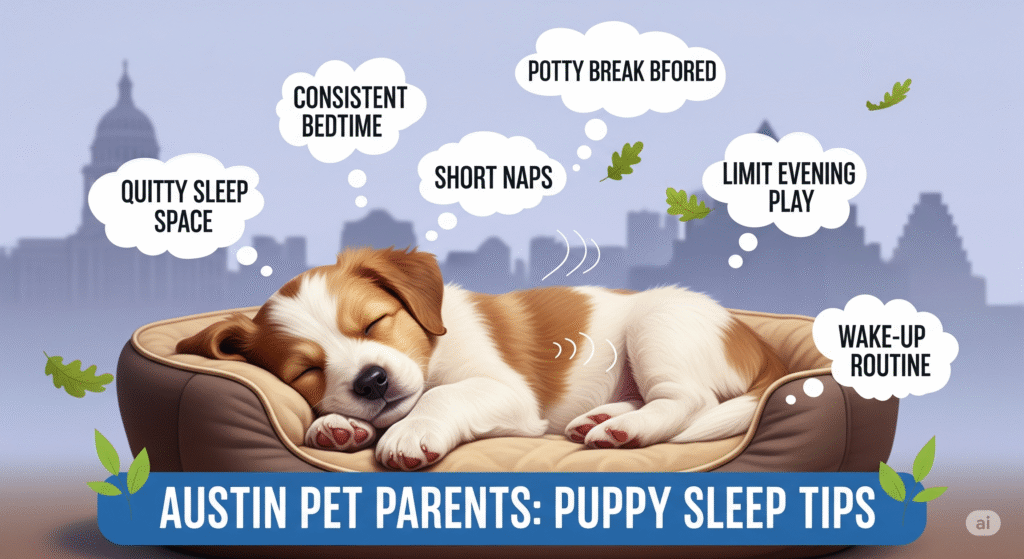
Bringing home a new puppy is an exciting adventure, especially if you live in a lively city like Austin, Texas. Between outdoor activities, dog-friendly restaurants, and weekend trips, your pup will have plenty of stimulation. But one of the most important parts of raising a healthy and happy puppy is establishing a proper sleep schedule. Just like babies, puppies need a lot of rest to grow, learn, and recharge their energy.
If you’re an Austin pet parent juggling work, social life, and your new furry friend, here are some practical tips to help your puppy develop a consistent sleep schedule.
Why Puppy Sleep Is So Important
Puppies grow quickly, and much of that growth happens while they’re asleep. Sleep supports brain development, muscle growth, and immune health. A well-rested puppy is also more likely to be calm, playful, and easier to train. Without proper rest, puppies can become cranky, hyperactive, or more prone to behavioral issues.
How Much Sleep Puppies Really Need
On average, puppies need 18–20 hours of sleep per day during their first few months of life. That doesn’t mean they’ll sleep through the night immediately. Instead, their sleep is spread out in naps throughout the day and night.
- Newborn to 3 months: Expect long stretches of sleep with frequent wake-ups for potty breaks.
- 3 to 6 months: Puppies begin adjusting to a more predictable pattern but still need plenty of naps.
- 6 to 12 months: By now, most puppies can sleep longer at night, closer to an adult dog’s routine.
Tips to Create a Healthy Puppy Sleep Schedule
1. Set Up a Comfortable Sleep Spot
Whether you choose a crate or a dog bed, make sure your puppy has a safe and cozy space to sleep. Many Austin pet owners prefer crate training because it helps with housebreaking and gives puppies a sense of security.
2. Stick to a Routine
Puppies thrive on routine. Feed, play, and take your puppy outside at consistent times each day. Over time, your puppy will naturally start to expect rest after certain activities.
3. Tire Them Out with Play
Austin is full of dog-friendly parks and walking trails like Zilker Park or Lady Bird Lake. Short play sessions or walks can help your puppy burn off energy, making it easier for them to settle down for a nap.
4. Limit Late-Night Excitement
Avoid rough play or feeding your puppy large meals right before bedtime. Instead, keep evenings calm and quiet to signal that it’s time to wind down.
5. Nighttime Potty Breaks
Young puppies won’t be able to hold their bladder through the night. Expect to take them out once or twice at first. As they grow, the need for nighttime potty breaks will gradually decrease.
6. Avoid Overstimulation
Austin is a busy city, and it’s tempting to take your puppy everywhere. But too much excitement—like crowded events or loud environments—can make it harder for them to rest. Balance social outings with quiet time at home.
7. Pay Attention to Nap Times
Your puppy will naturally nap throughout the day. Don’t wake them up unless necessary. Quality sleep during the day helps prevent nighttime restlessness.
Common Sleep Problems and How to Fix Them
- Crying at night: Often happens if your puppy feels lonely. Keeping their crate near your bed at first can help.
- Waking up too early: Try extending playtime before bed or adjusting feeding schedules.
- Restlessness: Make sure your puppy’s sleep space is free of noise, drafts, and distractions.
Final Thoughts for Austin Puppy Parents
Raising a puppy in Austin comes with unique opportunities and challenges. With so many dog-friendly spaces, your pup will get plenty of exercise and socialization. But balancing all that excitement with a proper sleep schedule is essential for healthy growth and good behavior.
By creating a routine, offering a comfortable sleeping spot, and making sure your puppy gets the rest they need, you’ll set the foundation for a happy, well-adjusted dog.
Remember, patience is key. With time and consistency, your puppy will learn when it’s time to play and when it’s time to sleep—making life easier for both of you. PetsDogPuppy
